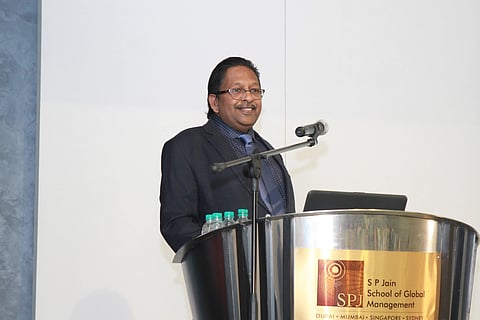

With the current advancements in Artificial Intelligence and Robotics, we wouldn’t be surprised if students are caught thinking to themselves — ‘Will the job I want be automated in the next ten years or less?’. Working professionals too are worried about the same thing. But what the workspace of the future really needs is the right blend of human and artificial intelligence. On May 4 at SP Jain School of Global Management’s second HR Conclave, Prof Christopher Abraham, CEO and Head – Dubai Campus, thought it was prudent to address this issue.
Getting right to the point, the very first question we shot at Prof Abraham, who is also the Senior Vice-President of Institutional Development and Professor of Leadership, Design Thinking and Organizational Behaviour at SP Jain School of Global Management, was, "Are we going to lose our jobs to robots in the future?" He dismissed it, calling the claim, “completely unfounded,” and stated that similar sentiments were echoed when computers were introduced for the first time as well. “Having said this, there are quite a few jobs that would be replaced by robots and AI, which can do these jobs faster, smarter and with fewer errors. Such jobs can be classified as repetitive, mechanical and data-driven,” he said and added that he expects these job replacements to happen in the next two or three decades.
And though we can’t stop this development from happening, what we can do is prepare ourselves for new career opportunities like AI Business Development Managers, Fitness Counsellors, AI Enabled Health Care Professionals, Cyber City Analysts, Human-Machine Collaboration Managers, Chief Trust and Transparency Officers and more. “The 21st century offers a plethora of opportunities for everybody. The mantra is to continuously learn, unlearn and relearn,” he pointed out. The key is to understand the limitations and challenges along with opportunities and prepare oneself accordingly, adviced Prof Abraham.
Prof Abraham went on to explain the three stages of AI, describing that the current stage we are in now is Artificial Narrow Intelligence — more of an initial, exploratory phase. This will be followed by Artificial General Intelligence, where computers and robots will be able to do all cognitive and emotional tasks of human beings, and then Artificial Super Intelligence, where there are possibilities of machines surpassing human capabilities. “This is indeed a scary possibility, but let’s remember that we as the creators of these technologies, by default also have ‘the kill switch’ to stop any fiasco from happening,” he concluded.
